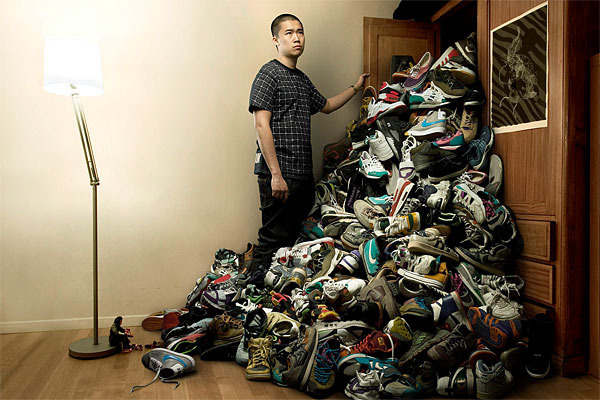當前位置: Language Tips> 流行新詞
分享到
年前大掃除的時候,發現家里有一堆從來沒有用過的東西,但是扔了又覺得可惜,只好繼續把它們放在那里。結果,家里的雜物越來越多,可有用的卻只有那么幾樣。有時候真的感覺自己要被這些雜物給淹沒了!

Stuffocation is the feeling of being overwhelmed and weighed down by material things, i.e. 'stuff'. In practice this can mean different things to different people, but classic examples include regularly having to rummage through masses of junk you never use in order to get to the items you actually need, opening a wardrobe brimming with garments and not being able to find a thing to wear, and on receiving a gift, not feeling pleasure or gratitude but a surge of indifference or anxiety about what you're going to do with it.
Stuffocation指被各種物品、雜物淹沒,導致不堪重負的感覺,我們可稱之為“雜物窒息”。這種雜物窒息的情況對不同的人來說情形各異,不過,比較典型的例子有:找到你真正需要的東西之前需要先翻遍一堆永遠都用不到的雜物,打開塞滿衣物的衣柜卻找不到一件能穿的衣服,或者,收到一份禮物的時候,感覺到的不是欣喜或者感激,而是一種漠然或者焦慮的心情,因為你開始想著這個禮物要怎么處理。
In short, rather than thinking of stuff in a positive way, believing that material things are useful or pleasant and enhance our lives, stuffocation embodies the idea that more things equate to more to deal with, more to organize, and so more hassle.
簡而言之,stuffocation傳遞的信息并不是那么積極:物品越多并不能對生活有更多益處,也不會提高生活質量,而是你需要更多的時間去處理、歸置這些物品,由此帶來的麻煩事兒也更多。
我們看到stuffocation其實是從suffocate(窒息)一詞演變而來的,由stuff+suffocation組合而成,同時也有形容詞形式的stuffocated和stuffocating用來描述不同的情景。
The term stuffocation is chiefly associated with trend forecaster James Wallman, author of a book of the same name published in 2013. Wallman also promotes the concept through a dedicated website, stuffocation.org, which features blog posts encouraging people to de-stuffocate their lives. Some evidence for use of the term pre-dates Wallman's book by a couple of years however, going back to 2010.
Stuffocation這個說法與時尚預測師James Wallman密切相關,他zai 2013年寫了一本名為Stuffocation的書,同時,他還在一個stuffocation.org的網站上宣傳這個概念,他在發表的博文中,鼓勵人們丟棄生活中多余的雜物,也就是咱們所說的“斷舍離”。這個詞更早的使用則要追溯到2010年。
Source: http://www.macmillandictionary.com/
(中國日報網英語點津 Helen)
上一篇 : 手機的“幽靈振動”
下一篇 :
分享到
關注和訂閱


電話:8610-84883645
傳真:8610-84883500
Email: languagetips@chinadaily.com.cn